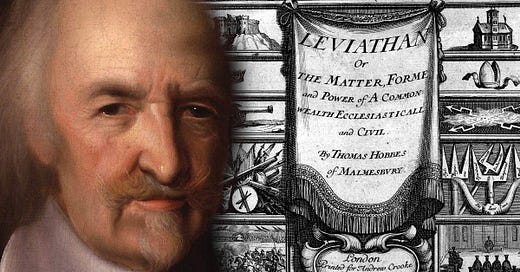Thomas Hobbes and the Birth of Political Realism
A Study Guide to Hobbes’ Leviathan, Part I: “Of Man”
Unlock the timeless wisdom of the West—join The Occidental Tourist for weekly free insights into the books and ideas that have shaped history, culture, and the human spirit!

“Where there is no common power there is no law, no injustice.
Force and fraud are in war the cardinal virtues.”
Thomas Hobbes, “Leviathan”
My Great Books reading club is discussing the first part of Thomas Hobbes’ Leviathan this month, the monumental 17th century treatise on power and the Commonwealth which is said to have originated modern political thought. We’ve read authors of a similar bent in the past year, including Machiavelli, Locke, and Rousseau. It will be interesting to compare Hobbes’ political views with theirs, especially as pertaining to power, the state of nature, and the social contract.
A Brief Biography of Thomas Hobbes
He was described by historian Will Durant as “the boldest heretic of his age,” yet upsets in Thomas Hobbes’ early life left him a timorous and bookish young man. He arrived prematurely on April 5, 1588 in Wiltshire, England—his mother blaming her untimely confinement on the imminent threat of the Spanish Armada. This prompted Hobbes to reflect later that she “gave birth to twins: myself and fear."1 His pugnacious father, an Anglican clergyman, later abandoned his anxious wife and three children after a brawl at the front door of their church. Hobbes was subsequently raised by an uncle.
At the age of fifteen, Hobbes entered Magdalen College, Oxford to read philosophy; but he quickly developed a distaste for Aristotle and turned his attention to other classical authors, and also fed his wanderlust on tales of famous English explorers. He would soon satisfy his desire to travel while employed as a tutor for the powerful Cavendish family of Devonshire, eventually completing four tours abroad, including his final eleven-year sojourn in Paris as a political refugee of the English Civil War—and a supporter of the doomed king, Charles I.
Hobbes’ first biographer, John Aubrey, describes his discovery of Euclid’s Elements at age 40 as a turning point of his intellectual life, sparking a lifelong interest in mathematics and a particular passion for geometry’s “art of reasoning.” His written achievements after this time are impressive. In 1629, Hobbes published a translation of Thucydides, followed by more than forty works of rhetoric, law, philosophy, optics, physics, and mathematics. Of these, Leviathan (1651) is considered his magnum opus and “one of the landmarks in the history of philosophy.”2
At the time of its publication, however, Leviathan met with widespread criticism and controversy. Although Hobbes advocated for absolute monarchy, his stance on the social contract was thought to undermine the divine right of kings as well as parliamentary authority. This cost Hobbes the support of Royalists and Parliament alike, while his overt materialism and attitude toward the Church incited accusations of heresy. As a result of these controversies, Hobbes was forced to retire to private life but his characteristic obstinacy kept him in continuous quarrels with political and academic opponents until the end of his life in 1679.
Analysis of Hobbes’ Leviathan
Keep reading with a 7-day free trial
Subscribe to The Occidental Tourist to keep reading this post and get 7 days of free access to the full post archives.



